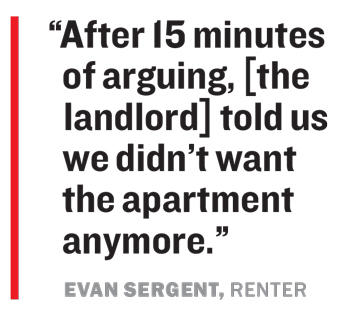 Jo Sheeley, a 23-year-old graduate student, started hunting for a rental apartment before news of the broker fee ban changed the equation.
Jo Sheeley, a 23-year-old graduate student, started hunting for a rental apartment before news of the broker fee ban changed the equation.
Sheeley and her partner initially found a place in Greenpoint, Brooklyn, in early February, they said.
Then other realities set in.
“It was listed as having a broker’s fee, which, at the time, we didn’t have a second thought about,” Sheeley said. “We knew it was something we might have to pay.”
Once the Department of State’s guidance on landlords paying broker fees became publicly known, though, Sheeley said they brought it up with the building’s owners, and they ended up losing out on the apartment.
“We got into a tiff with them about whether we needed to pay the broker’s fee,” said Sheeley’s partner, Evan Sergent, a research assistant at Columbia University Medical Center, who’s also 23. “After 15 minutes of arguing, they told us we didn’t want the apartment anymore.”
The couple ultimately found a new apartment in Crown Heights.
But their search underscores a problem for many New York City renters on the hunt for new apartments: The lack of clarity around the state’s broker fee guidance has become a major point of confusion and tension.
Sergent said his biggest issue with the building’s owners “was simply the fact that they were unwilling to discuss the new guidance and unwilling to work with us.”
“Ripple effects”
Many of those who lauded the change when the news broke are now unclear about what the rules are and what they should expect to pay if and when they find a place — at least while a state judge’s temporary restraining order remains in place.
For the city’s residential landlords, it’s also a precarious situation.
Landlords who are free to charge market-rate rents can bake the extra cost of a broker fee into their leases. But it’s a lot more complicated for owners of stabilized buildings, who can’t recover the added expenses through rent hikes.
 “It’s certainly more of a squeeze on the brokerage model, but it has ripple effects on rent-stabilized building owners,” said Raphael Lipschitz of SCL Management, which operates a portfolio of multifamily properties in Brooklyn consisting mainly of regulated units.
“It’s certainly more of a squeeze on the brokerage model, but it has ripple effects on rent-stabilized building owners,” said Raphael Lipschitz of SCL Management, which operates a portfolio of multifamily properties in Brooklyn consisting mainly of regulated units.
“On stabilized apartments, where the legal rent is fixed and cannot be increased due to the same laws, how would an owner recoup the cost?” he noted.
One owner of a large portfolio of rent-stabilized units said the guidance makes warehousing apartments look more attractive.
“This will just make it harder to rent the apartments that were borderline worth renting,” the landlord said on the condition of anonymity. “It’s essentially an additional expense that I can’t recover, making it less likely that I’ll rent the apartment.”
For landlords who have obligations to lenders and investors, however, keeping apartments off the market can present its own challenges, according to industry sources.
Louis Adler, co-founder of the brokerage Real New York, which works with about 100 landlords, said he and his partner were on the phone late into the night the day The Real Deal broke the news of the state’s guidance, trying to assuage clients’ concerns.
“The conversation we’re having quite often today is, the rents are going to have to go up,” he said at the time.
Related: Rental firms grieve over brokerage fees
AJ Clarke’s Michael Rothschild, whose company manages roughly 150 rental properties in Manhattan and is actively leasing out apartments in 10 to 20 buildings, said his firm has agreed with owners to increase asking rents by 5 percent to cover the cost of broker fees.
“We don’t really know if that will hold, but we didn’t know how else to handle it,” Rothschild noted. “Most of our buildings are not full-service buildings. It’s all legwork by our brokers to show apartments.”
Karla Saladino, of the brokerage Mirador Real Estate, said her firm’s landlord clients also confirmed they would pay broker fees and asked them to increase asking rents on current listings from between $500 and $1,300.
And Compass rental agent Jed Wilder said that listings were being redesignated as no-fee units with 8 to 10 percent higher asking rents.
But Bruce Garro, a 30-year-old software engineering manager who’s planning to move back to New York from Houston, said the uncertainty surrounding broker fees and who pays them would definitely impact his search.
“The more certainty I have around these parameters that might get negotiated, the more willing I am to jump into that listing,” he said.
Leases in limbo
In making their case for a temporary restraining order, lawyers for the real estate industry emphasized that many rental deals are hanging in the balance, impacting landlords, brokers and renters.
The sudden imposition of the new rule last month put “thousands” of leases in jeopardy, according to a petition against the DOS filed by the Real Estate Board of New York, the New York State Association of Realtors and 12 brokerages.
“The unwinding of these pending transactions … will harm landlords (who face the prospect of losing substantial rental income they have reasonably expected to receive),” the Article 78 proceeding states.
The state’s guidance, if it stands, would also harm brokers who sourced deals “and most of all consumers, who may not then close on apartments they seek to rent, and have been misled by the DOS’s erroneous and arbitrary interpretation and improper rulemaking,” the lawsuit states.
In an affidavit supporting the industry petition seeking to block the guidance, Bond New York claimed “thousands” of rental deals that were underway are stuck in limbo because potential tenants are refusing to pay broker fees.
If the state’s guidance sticks, landlords could be left holding the bag, argued Hal Gavzie, Douglas Elliman’s executive manager of leasing.
“Landlords need these transactions, which had been fully agreed to by the tenant, or they will face the prospects of losing another month’s rent, at least,” Gavzie argued in an affidavit supporting the same lawsuit. Smaller landlords in particular will feel the effects acutely, according to industry sources.
Sheeley, the graduate student, also criticized how muddled the state’s process around changing broker fee rules has been.
“I knew there were some new tenant laws, but they weren’t super clear about broker fees. They just kind of mentioned the price you should pay for credit checks,” they said. “It shouldn’t take complicated knowledge for people to be able to get an apartment without paying unnecessary fees.”
Sergent, Sheeley’s partner, said they had started looking into alternative ways to find an apartment due to the confusion.
“We are definitely skirting around the more traditional NYC apartment hunting procedure now,” he said. “And we’re also a lot more cautious about brokers.”
— Additional reporting by E.B. Solomont, Mary Diduch and Sylvia Varnham O’Regan
